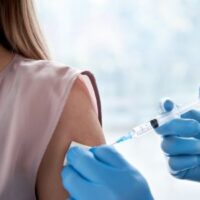Common Vaccine-Related Injuries and Their Symptoms

Vaccines are crucial for preventing serious illnesses and maintaining public health, yet, like all medical interventions, they can occasionally cause adverse reactions. Understanding common vaccine-related injuries and their symptoms is essential for early detection and effective treatment. Here we explore several typical vaccine-related injuries, such as Guillain-Barré Syndrome (GBS) and anaphylaxis, detailing their warning signs and symptoms.
The information provided in this blog is for educational purposes only and is not intended as medical advice. Always seek the advice of your physician or other qualified health provider with any questions you may have regarding a medical condition or vaccine-related injury. Never disregard professional medical advice or delay in seeking it because of something you have read on this blog. If you believe you have experienced a vaccine-related injury, contact a healthcare professional immediately.
Guillain-Barré Syndrome (GBS)
Guillain-Barré Syndrome (GBS) is a rare but serious condition where the body’s immune system attacks the peripheral nervous system. It can occur after infections or, in some cases, following vaccinations. The symptoms and warning signs include:
Weakness and Tingling: The most common early symptoms of GBS are weakness and tingling in the legs, which can spread to the upper body.
Muscle Weakness: As GBS progresses, muscle weakness can intensify, potentially leading to difficulty walking or even paralysis.
Severe Pain: Some individuals experience severe pain, often described as an aching or cramping sensation.
Difficulty Breathing: In severe cases, GBS can affect the muscles involved in breathing, requiring emergency medical attention.
Heart and Blood Pressure Issues: GBS can impact autonomic functions, leading to fluctuations in heart rate and blood pressure.
Guillain-Barré Syndrome (GBS) is typically diagnosed through a combination of clinical examination, nerve conduction studies, and a lumbar puncture to analyze cerebrospinal fluid.
The treatment for GBS often includes immunoglobulin therapy or plasmapheresis to reduce the immune system’s attack on the nervous system. Additionally, physical therapy plays a crucial role in the recovery process, helping patients regain strength and mobility.
Anaphylaxis
Anaphylaxis is a severe, potentially life-threatening allergic reaction that can occur rapidly after exposure to an allergen, including components in some vaccines. Symptoms and warning signs include:
Skin Reactions: These can include hives, itching, and flushed or pale skin.
Swelling: Swelling of the face, eyes, lips, or throat can occur, which may lead to difficulty breathing.
Respiratory Issues: Symptoms include wheezing, difficulty breathing, and a tight feeling in the chest.
Gastrointestinal Symptoms: These may include nausea, vomiting, diarrhea, or abdominal pain.
Dizziness or Fainting: Anaphylaxis can cause a rapid drop in blood pressure, leading to dizziness or loss of consciousness.
Rapid Pulse: A rapid, weak pulse is a common sign of anaphylaxis.
Anaphylaxis is typically diagnosed based on rapid onset of symptoms following exposure to a known allergen.
Immediate treatment with epinephrine (adrenaline) is crucial. Additional treatments may include antihistamines, corticosteroids, and supportive care such as oxygen or intravenous fluids.
Other Vaccine-Related Injuries
Beyond GBS and anaphylaxis, there are other less common vaccine-related injuries that individuals should be aware of, such as:
Shoulder Injury Related to Vaccine Administration (SIRVA) – Typically presents with symptoms such as pain, weakness, and limited range of motion in the shoulder. This condition usually results from improper vaccine injection techniques, which can lead to injury of the shoulder’s structures.
Fever and Febrile Seizures – Typically manifest as high fever and seizures, particularly in young children. These seizures can be triggered by fever following vaccination in children who are susceptible to febrile seizures.
Allergic Reactions to vaccines can present with mild to moderate symptoms, such as rash, itching, or swelling. These reactions are often caused by components in the vaccine, including gelatin, egg protein, or antibiotics used during the vaccine production process.
Monitoring and Reporting Vaccine Reactions
It is essential to monitor for any adverse reactions following vaccination and to report them to healthcare providers immediately. The Vaccine Adverse Event Reporting System (VAERS) allows individuals and healthcare professionals to report any suspected vaccine-related injuries. This system helps in identifying potential trends and ensuring vaccine safety.
Contact The Villari Law Firm
If you or a loved one has experienced a vaccine-related injury, The Villari Law Firm can provide the legal assistance you need. Our attorneys are knowledgeable and experienced in vaccine injury cases and are dedicated to helping you navigate the complexities of your claim. Contact us today for a free consultation and let us help you secure the compensation you deserve. Call The Villari Law Firm now to discuss your case.
Source:
historyofvaccines.org/getting-vaccinated/vaccine-faq/vaccine-side-effects-and-adverse-events
